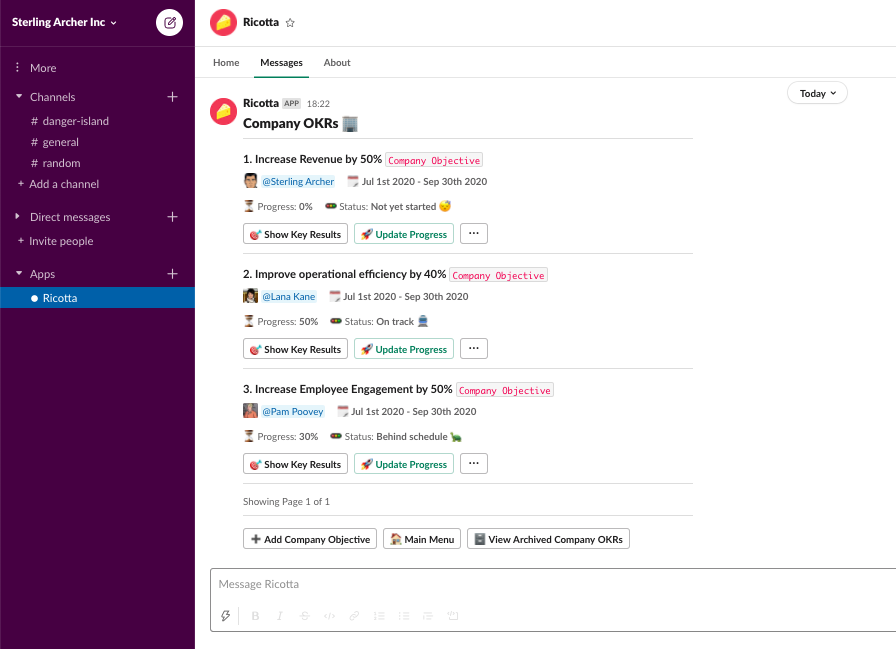What are OKRs and why should your team adopt them?
Do you often ask yourself, “How do I make work fulfilling for my teams?” The answer is pretty simple - connecting the day-to-day tasks to a bigger vision and goals. Your next question is probably - “Okay, but how do I do that?”
When looking for a new way to set efficient goals, you might want to look at OKRs - Objectives and Key Results - which is a highly effective framework that can connect the entire company to multiple common goals. OKRs have also proven to be effective for setting and achieving goals in a timely manner and are used by large organisations such as Google, Intel, Facebook, Twitter, LinkedIn, Airbnb, etc.
So, what are OKRs?
Simply put, OKRs are Objectives and Key Results, which when combined, form a collaborative tool that helps your organisation get focused, aligned, and engaged in what matters the most. When it comes to remote teams, OKRs help remote teams to be extra coordinated.
It is used to set goals with quantifiable and measurable key results. You can set objectives and their respective key results, track progress and align the entire team to work towards these objectives (about 2 to 3 each quarter). OKRs are effective for all kinds of organisations - from small startups to large companies.
What is an ‘Objective’?
‘Objectives’ are basically what you want your organisation to accomplish. An objective helps you answer the question “What do we want to do?” and set out aspirational goals for your organisation. “Become a market leader” or “Achieve product-market fit” are some examples of Company-level objectives.
A well-defined objective should be time-bound and should be easily measurable.
What are 'Key Results'?
Key results help you measure your success in accomplishing the goals you set. A Key Result helps you answer the question “Are we meeting our objectives?”
In a nutshell, you set objectives and then simply define how to achieve them in the best possible way using measurable Key Results.
However, for OKRs to be effective, they should be aspirational and help your team reach their maximum potential. This type of risk-taking can help you come closer to your vision!
OKRs can be at a company, team or personal level. You can look at some OKR examples to see how they differ at each level.
Example of Company Objectives on Ricotta

But how will OKRs help my team?
1. Focus on what matters
OKRs help bring focus on common goals. But do keep in mind that these goals aren’t “strict” goals - OKRs are all about setting bold goals that may not be achieved 100% by your team. Why you ask? Because these are not impossible but ambitious goals. This means that even if they are 70% achieved by the team, it is considered good in an OKR context.
OKRs give clear direction to every team and individual enabling them to plan and move towards achieving common goals. It also helps track regular progress and inspire people to aim high.
2. Promote transparency and alignment
OKRs promote transparency since they are clearly visible for everyone in the organisation. Effective OKRs clearly lay out each objective and key result at every level of the company so that each person has access to them.
OKRs help everyone to be on the same page. All departments, levels, and teams can work and see how the goals align with the company’s vision and strategy
3. Engage and inspire
OKRs connect employees to your company vision which impacts their performance. They are believed to be tied to increased accountability and productivity so that everyone feels that their work matters. They also enable employees to share their accomplishments openly thus helping them to grow in their careers.
Moreover, employees get the freedom to list down their personal objectives and results that are tied to an organisation’s overall objectives OKRs. This makes them much more engaged in their work and urges them to take ownership of the goals.
4. Enable easy collaboration
OKRs help everyone in the organisation understand how every employee or department has a critical role to play in achieving the goals. Everyone is aware of what needs to be achieved every week and every quarter. This helps them stay on track while keeping the company vision in mind. Moreover, the employees understand when to work together and on what, facilitating a collaborative effort.
5. Make the right decisions
Since OKRs are measurable, they allow you to be more data-driven since everything relies on those numbers. Moreover, you can make effective decisions and keep your organisation’s progress in check. Through OKRs, you can easily figure out when and where you are going off track and take a course of action before any problems arise.
How can I implement OKRs in my team?
Now that you know what OKRs are all about, you must be thinking “What’s next?”
One thing is clear - such goal setting is worth trying! If several small startups and large companies like Google, Intel, Facebook, Twitter, LinkedIn, and Airbnb are effectively using it, then why not you? Invest time in preparing and adjusting to them and your team would thank you!
So what are you waiting for? Start implementing OKRs now.